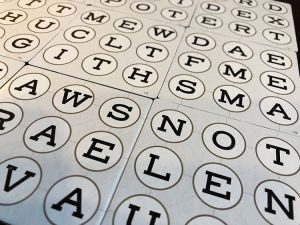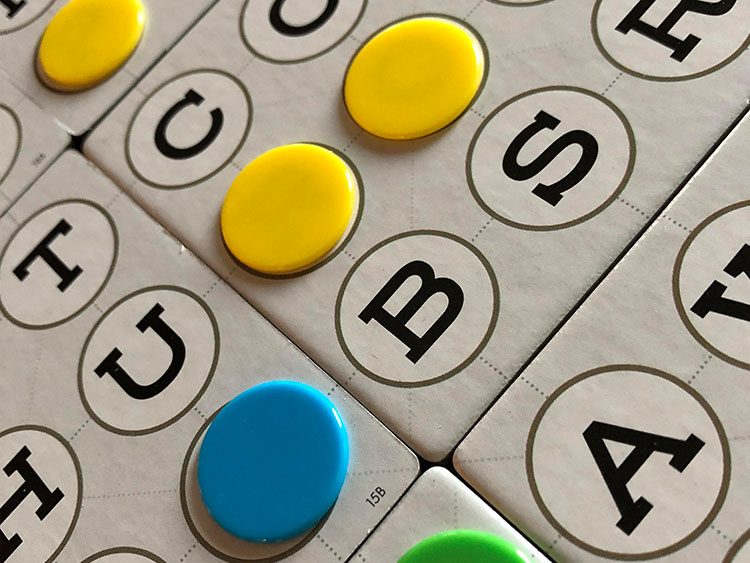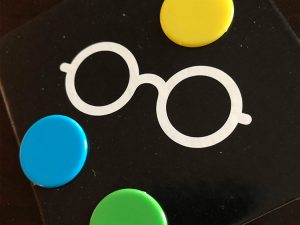 Did you know that the word search was invented in Norman, OK in 1968? Did you know that Boggle was released by Parker Brothers in 1972? Did you know that decades after these events, Sparkworks released Blind Spot, which brings together elements of both these puzzles to create a new type of board game? Well, now you do.
Did you know that the word search was invented in Norman, OK in 1968? Did you know that Boggle was released by Parker Brothers in 1972? Did you know that decades after these events, Sparkworks released Blind Spot, which brings together elements of both these puzzles to create a new type of board game? Well, now you do.
Blind Spot is a real time word game for 1-4 players that takes about 20 minutes to play. We have found that Blind Spot plays best with one or two players.
Game Overview:

A randomized 9×9 grid of letters is set up at the beginning of a game. On a player’s turn, they cover one of the letters with a marker of their player’s color, then use letters on either side of that marker to create a word of at least three letters horizontally or vertically, reading the letters forwards or backwards. Players can create words across any number of their own markers but cannot cross any other players’ markers.
If a player cannot find a word to create, they place a marker on the penalty square. In subsequent turns, that player can form words diagonally. If that player places a second marker on the penalty square, they are eliminated from the game. The last player still in the game is declared the winner!

Gameplay Experience:
When Blind Spot hits the table, you cannot help but experience a feeling of deja-vu of playing Boggle with a grandparent, endeavoring to create words out of the randomness of the alphabet soup, with even more letters to choose from. Blind Spot offers a variation on this classic mechanic by forcing players to cover up a letter before forming the word, and requiring the word contain the space that was just covered. Based on the rules as written, it should work.

Unfortunately, it does not. While we have no issues with a challenging game, the actual process of achieving this goal is extremely difficult. Our brains are wired to find words within a jumble of letters, which is why word searches are so popular amongst kids and seniors alike. But the idea of finding a word around a blank space, while putting it under a 30-second time limit just adds insult to injury. We found ourselves simply chucking the sand timer and giving ourselves as much time as necessary to find a spot to mark and a word to create.
When playing solo or with two players, there is at least enough room on the letter grid to keep word options open, which evaporates as soon as you add an additional player or two. In one of our plays, the fourth player was only able to play a single word before having to place a penalty marker, due to the space that was taken up by their opponents. While it did not happen all the time, playing this game with any more than two players is concerning.

Which brings us to another major issue with the game, which is that the only words that typically are formed are 3-letter words. In our plays, we only were able to find a 4-letter word a handful of times and were never able to find a five-letter word in the scramble. This type of limitation severely hampers the replay value and interest. Combine that with the limited “dictionary” that is provided for 3-letter words, and it adds up to a not-so-exciting gameplay experience. We decided to default to the Scrabble dictionary to determine the legality of words played.
Final Thoughts:
Blind Spot gets kudos for attempting to reset traditional word-searching game mechanics. Unfortunately, the implementation leaves quite a bit to be desired. If you are looking for a quick-playing letters-based game, we recommend you look elsewhere.
Final Score: 1.5 Stars – Unintuitive, random and repetitive.
 Hits:
Hits:
• Challenging mechanic for word creation
Misses:
• Forcing time constraints is a poor design choice
• Illusionary replay value
• Only being able to form three-letter words is not fun





















